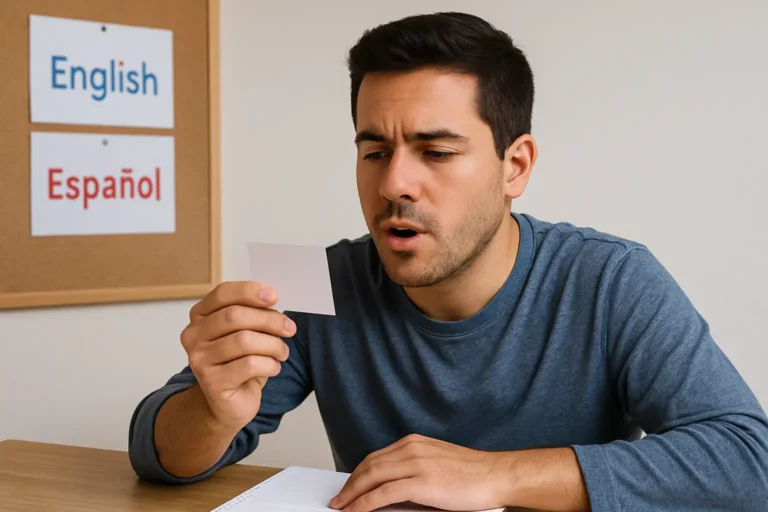Mastering English Sounds Spanish Speakers Often Struggle With
Hard words to pronounce in English for Spanish speakers can be frustrating, especially when the sounds don’t exist in Spanish. If you’ve ever felt unsure about your pronunciation, don’t worry—you’re not alone! Many students I’ve worked with find certain English sounds very challenging because they simply don’t occur in their native language. These tricky English words cause all sorts of pronunciation challenges for Spanish speakers and often lead to common English mistakes.
💬 Real Example: One of my students from Mexico once said, “I cot a new hat” instead of “I caught a new hat.” She meant “got,” but confused the /g/ and /k/ sounds, and the /ɒ/ vowel wasn’t there at all!
Here are some sounds Spanish speakers often find tricky:
🔸 /æ/ – Like in “cat,” often confused with /a/
🔸 /v/ – Like in “very,” often pronounced as /b/
🔸 Schwa /ə/ – That sneaky sound in “banana” or “sofa”
📚 Learning Tip: One great way to improve is by reading aloud with a book that includes audio examples. Try the 7 Best English Conversation Books for Everyday Speaking. They provide pronunciation notes and realistic dialogues.
Understanding how English differs from Spanish helps you fix these tricky spots and speak with more confidence.
Table of Contents
Why ‘Sheet’ and ‘Seat’ Are Not the Same Thing
Hard words to pronounce in English for Spanish speakers often lead to some funny (and embarrassing) mix-ups. One of the most memorable examples? Mixing up “sheet” and “seat.” While they may look harmless on paper, one wrong vowel sound can completely change the meaning!
🎯 Confusing Sound:
🔹 /iː/ as in “seat” vs. /ɪ/ as in “sit”
🔹 Result: Saying “sheet” too short turns it into another word entirely…
😳 True Story: A Spanish-speaking colleague once confidently told our class, “I need clean sh*t!” He meant “sheet.” We all burst into laughter, but it highlighted how important vowel length is.
These are difficult English sounds and tricky English words that don’t exist in Spanish. They can create confusing English words and even embarrassing moments.
🌍 For real-life examples of English usage during travel, read the Do They Speak English in Turkey Travel Communication Guide.
📘 If your goal is professional improvement, visit Master Business English in 2025: Vocabulary, Idioms, and Conversations.
The key takeaway? Don’t be afraid to slow down and stretch those vowels!

The Spanish ‘E’ vs. the English ‘I’ — A Tricky Vowel Switch
Hard words to pronounce in English for Spanish speakers often include short, simple-looking words like “live” and “leave.” This is because the English “i” often gets pronounced like the Spanish “e.” This subtle difference leads to pronunciation challenges and English mistakes Spanish speakers regularly make.
📌 Example Mistake: Saying “I leave here” when you mean “I live here.”
🧠 Why It Happens:
Spanish vowels are fixed and consistent.
English vowels have multiple sounds, especially “i.”
📍 Helpful Analogy: Think of “live” as a short, light tap (like a quick note) and “leave” as a stretched-out tone.
🗺️ Explore the Do They Speak English in Barcelona Tourist Language Tips for more examples in travel settings.
Consistency and repetition are your friends here. Keep practicing in full sentences!
Words Like “Beach” and “Bitch” That Can Get You in Trouble
Let’s face it: some hard words to pronounce in English for Spanish speakers can get you into really awkward situations. One of the most common—and hilarious—mix-ups is between “beach” and… well, you know.
💬 Common Confusion:
/iː/ as in “beach” vs. /ɪ/ as in “bitch”
One is a vacation spot, the other is a curse word 😅
👂 Real Conversation: A student once proudly said, “I love going to the b*tch in the summer.” I knew what she meant, but others might not!
These are classic tricky English words and confusing English words. Mispronouncing them can turn an innocent sentence into something offensive.
🌎 Practice in real settings with Do People Speak English in Spain A Guide for Tourists. It gives cultural and practical advice.
📖 Want to learn more? Check out the history of the english language to understand how these sound challenges came to be.
With practice, these awkward moments can turn into learning milestones.

How the English ‘Th’ Sound Confuses Native Spanish Speakers
Hard words to pronounce in English for Spanish speakers often include the infamous “th” sound. It’s one of the most difficult English sounds because there’s simply nothing like it in Spanish. Many learners substitute /t/, /d/, or /s/ instead.
🔤 Typical Mistakes:
“Think” becomes “tink”
“This” becomes “dis”
😅 Funny Memory: A student once asked, “Can I tank you?” when thanking me after class.
These are confusing English words for Spanish learners, and they’re frequently involved in English mistakes Spanish speakers make.
👅 Fix It Tip: Stick your tongue gently between your teeth. Practice “th” in words like “thanks,” “with,” and “both.”
📚 A great article to explore pronunciation in context: Do People in Denmark Speak English Find Out the Truth.
With time, your “tanks” will become “thanks”!
When Consonants Disappear or Change — ‘Walk’, ‘Talk’, ‘Would’
If you’ve ever wondered why native speakers say “walk” without pronouncing the “l” or “would” without a strong “d,” you’re not alone. These are hard words to pronounce in English for Spanish speakers because English often drops or blends consonants.
🧩 Examples of Dropped Sounds:
“walk” → sounds like “wok”
“would” → barely sounds like the spelling at all
📘 Real Story: A student kept saying “wool-d” until she heard an audiobook and said, “Wait, there’s no D?” Mind blown.
Tricky English words like these don’t follow the phonetic rules you may be used to. It’s a major pronunciation challenge Spanish learners face and causes many English mistakes Spanish speakers make.
🎧 Tip: Listen first, then repeat. Don’t trust the spelling!
Tips to Fix Pronunciation of These Hard Words to Pronounce in English for Spanish Speakers
You’ve seen the challenges—now let’s look at solutions! These tips will help you conquer the most hard words to pronounce in English for Spanish speakers.
🗣️ 1. Stretch Your Vowels
Practice saying words like “sheet,” “beach,” and “seat” slowly and clearly. Many difficult English sounds require more mouth movement than you expect.
📱 2. Record and Listen
Use your phone to record your pronunciation. Compare it to native speakers online. This will help identify confusing English words you may not hear in your own speech.
📚 3. Read with Audio Books
Try the 7 Best English Conversation Books for Everyday Speaking again—but this time with the audio on!
🧘 4. Relax Your Face
Tension in your jaw or tongue can affect clarity. Try speaking while relaxed to help shape tricky English words more naturally.
📩 5. Ask Questions!
Need clarification or more tips? Contact Us—we’d love to help!
With a bit of humor and practice, you’ll sound smoother and feel more confident every day.

Do People in Turkey Speak English What You Should Know
Do people in Turkey speak English Learn where English is spoken and how easy it is to communicate as a traveler

Can You Speak English How to Ask and Answer Politely
Can you speak English Learn the best ways to ask and respond to this question politely in different travel and social settings

7 Books to Expand Your English Vocabulary Fast
Books to expand vocabulary help you speak and write better Discover top books that make learning new words enjoyable
